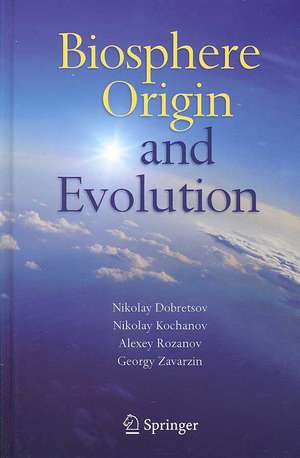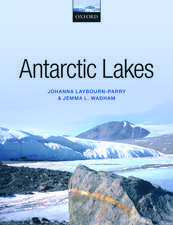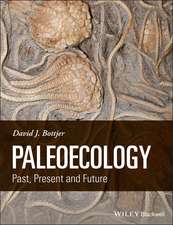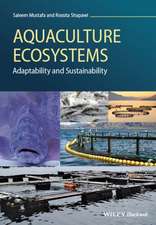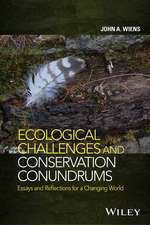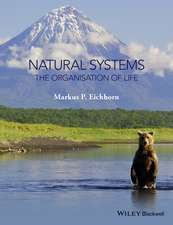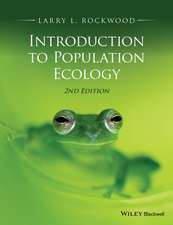Biosphere Origin and Evolution
Editat de Nikolay Dobretsov, Nikolay Kolchanov, Alexey Rozanov, Georgy Zavarzinen Limba Engleză Hardback – 17 dec 2007
| Toate formatele și edițiile | Preț | Express |
|---|---|---|
| Paperback (1) | 797.75 lei 38-44 zile | |
| Springer Us – 28 noi 2010 | 797.75 lei 38-44 zile | |
| Hardback (1) | 956.33 lei 6-8 săpt. | |
| Springer Us – 17 dec 2007 | 956.33 lei 6-8 săpt. |
Preț: 956.33 lei
Preț vechi: 1166.26 lei
-18% Nou
Puncte Express: 1434
Preț estimativ în valută:
182.99€ • 199.40$ • 154.20£
182.99€ • 199.40$ • 154.20£
Carte tipărită la comandă
Livrare economică 23 aprilie-07 mai
Preluare comenzi: 021 569.72.76
Specificații
ISBN-13: 9780387686554
ISBN-10: 038768655X
Pagini: 427
Ilustrații: XX, 437 p.
Dimensiuni: 155 x 235 x 25 mm
Greutate: 0.76 kg
Ediția:2008
Editura: Springer Us
Colecția Springer
Locul publicării:New York, NY, United States
ISBN-10: 038768655X
Pagini: 427
Ilustrații: XX, 437 p.
Dimensiuni: 155 x 235 x 25 mm
Greutate: 0.76 kg
Ediția:2008
Editura: Springer Us
Colecția Springer
Locul publicării:New York, NY, United States
Public țintă
ResearchDescriere
Modern natural science shows that the infancy of life on Earth experienced prebiotic evolution and included the emergence of primitive self-reproducing biologic forms and their systems. The subsequent coevolution of inorganic environment and biologic systems resulted in global propagation of life over the Earth and its enormous diversification. Diverse living organisms colonized the land, water, and atmosphere, as well as upper layers of the lithosphere, thereby forming the biosphere. Formerly, it was thought that abiogenic synthesis of prebiotic matter occurred in the Earth’s atmosphere on land surface. However, the presence of life signs in rocks more than 3. 5 Gyr old suggests that the chemical matter evolution stage with synthesis of organic compounds from simple molecules is more likely to have occurred in the preglobal circumstellar disk together with the RNA world and the emergence of life itself. This notion removes the restriction imposed by the Earth’s age and environmental conditions on the young Earth. It is favored by detection of intricate organic compounds on meteorites, comets, and (according to spectral data) in gas–dust nebulae. The detection of life traces in meteorite bodies of the same age as the Earth and the Solar System indicates that life in the latter can be older than the Earth as documented by geologic records. The key features of living systems allowing their existence in time and space are self-reproduction and ability to evolve. The inseparability of these features was expressed by N. V.
Cuprins
Problems of Biosphere Evolution and Origin of Life.- On Important Stages of Geosphere and Biosphere Evolution.- Microbial Biosphere.- Prebiological Stages of Evolution and RNA World on the Earth and in the Space.- Astrocatalysis Hypothesis for Origin of Life Problem.- Comets, Carbonaceous Meteorites, and the Origin of the Biosphere.- Hierarchical Scale-Free Representation of Biological Realm—Its Origin and Evolution.- The Prebiotic Phase of the Origin of Life as Seen by a Physical Chemist.- Prebiotic Carbohydrates and Their Derivates.- Theoretical and Computer Modeling of Evolution of Autocatalytic Systems in a Flow Reactor.- RNA World: First Steps Towards Functional Molecules.- Trans Hammerhead Ribozyme: Ligation vs. Cleavage.- Paradoxical Bistate Status of a Prebiotic Microsystem: Universal Predecessor of Life.- Archaen–Proterozoic Ecosystems: Their Interaction and Contemporary Analogous.- The Ancient Anoxic Biosphere Was Not As We Know It.- Evolutionary Aspects of Geochemical Activity of Microbial Mats in Lakes and Hydrotherms of Baikal Rift Zone.- On the concept for the Organization of the Modern Biosphere in the Terrestrial Subsurface.- Biomineralization and Evolution. Coevolution of Mineral and Biological Worlds.- Visualization of the Silicon Biomineralization in Cyanobacteria, Sponges and Diatoms.- Transformational Changes in Argillaceous Minerals due to Cyanobacteria.- Coevolution of Geological and Biological Events in Phanerozoe.- Ecological Revolution Through Ordovician Biosphere (495 to 435 Ma ages): Start of the Coherent Life Evolution.- Ecosystems and Molecular Genetic Factors of Organism Evolution.- Evolution by Gene Duplications: from the Origin of the Genetic Code to the Human Genome.- Evolution of the Translation Termination System in Eukaryotes.- The Hedgehog Signaling Cascade System: Evolution and Functional Dynamics.- Approaches to the Resolution of Contradictions Between Phylogenetic Systems Based on Paleontological and Molecular Data.- Chromosomes and Speciation.- Biotic Turnover in Superorganism Systems: Several Principles of Establishment and Sustenance (Theoretical Analysis, Debatable Issues).- Chromosomes and Continents.- Biosphere and Human Being.- Genetic Landscape of the Central Asia and Volga–Ural Region.- Problems of Reconstruction of Paleoenvironment and Conditions of the Habitability of the Ancient Man by the Example of Northwestern Altai.- The Settling of the Ancient Man by the Example of North-Western Altai.- Evolutionary History of Wheats—the Main Cereal of Mankind.
Recenzii
From the reviews:
"The contents of this dense volume are mainly derived from a Russian Academy of Sciences research program of the same name, culminating in a conference held in Novosibirsk in 2005. … Dobretsov … and colleagues have compiled papers by microbiologists, chemists, geologists, paleobiologists, geneticists, and archaeologists. The book introduces novel theoretical frameworks and new data in many areas … . Summing Up: Recommended. Graduate students and researchers/faculty." (W. L. Cressler, CHOICE, Vol. 45 (10), June, 2008)
"The contents of this dense volume are mainly derived from a Russian Academy of Sciences research program of the same name, culminating in a conference held in Novosibirsk in 2005. … Dobretsov … and colleagues have compiled papers by microbiologists, chemists, geologists, paleobiologists, geneticists, and archaeologists. The book introduces novel theoretical frameworks and new data in many areas … . Summing Up: Recommended. Graduate students and researchers/faculty." (W. L. Cressler, CHOICE, Vol. 45 (10), June, 2008)
Textul de pe ultima copertă
Modern natural science shows that the infancy of life on Earth experienced prebiotic evolution and included the emergence of primitive self-reproducing biologic forms and their systems. The subsequent coevolution of inorganic environment and biologic systems resulted in global propagation of life over the Earth and its enormous diversification. Diverse living organisms colonized the land, water, and atmosphere, as well as upper layers of the lithosphere, thereby forming the biosphere.
The book covers notions by scientists of various branches on the evolutionary relationship between the biosphere and geosphere, evolution features at various levels of living matter organization, and problems of prebiotic evolution and life origin. The data were collected in the course of the RAS program "Biosphere origin and evolution" (subprogram II) in 2003–2006. The objectives of this subprogram were (1) generalization of data related to problems of biosphere origin and evolution accumulated by geneticists, molecular biologists, zoologists, botanists, paleontologists, microbiologists, geologists, chemists, and archaeologists; (2) search for new interdisciplinary approaches to biosphere origin and evolution; (3) development of a "lingua franca" understandable by experts in various fields, which would allow apprehension of results concerning the topic obtained in allied sciences
The book covers notions by scientists of various branches on the evolutionary relationship between the biosphere and geosphere, evolution features at various levels of living matter organization, and problems of prebiotic evolution and life origin. The data were collected in the course of the RAS program "Biosphere origin and evolution" (subprogram II) in 2003–2006. The objectives of this subprogram were (1) generalization of data related to problems of biosphere origin and evolution accumulated by geneticists, molecular biologists, zoologists, botanists, paleontologists, microbiologists, geologists, chemists, and archaeologists; (2) search for new interdisciplinary approaches to biosphere origin and evolution; (3) development of a "lingua franca" understandable by experts in various fields, which would allow apprehension of results concerning the topic obtained in allied sciences
Caracteristici
Contains articles based on the oral presentations given at the International Workshop on the Bioshphere Origin and Evolution (BOE 2005)
